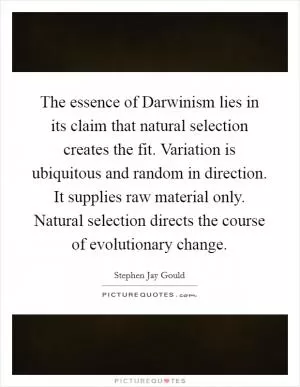The proof of evolution lies in those adaptations that arise from improbable foundations

The proof of evolution lies in those adaptations that arise from improbable foundations
Stephen Jay Gould, a renowned paleontologist and evolutionary biologist, was a firm believer in the theory of evolution. He argued that the proof of evolution lies in the adaptations that arise from improbable foundations. Gould's work focused on the concept of punctuated equilibrium, which suggests that evolution occurs in rapid bursts of change followed by long periods of stability.One of the key aspects of Gould's argument is the idea that evolution is not a linear process, but rather a complex and unpredictable one. He believed that the adaptations that arise in organisms are often the result of random genetic mutations that are then selected for by the environment. These mutations may seem improbable at first, but over time they can lead to significant changes in the organism's phenotype.
Gould's research on the fossil record provided evidence for the idea of punctuated equilibrium. He found that many species show little to no change over long periods of time, only to suddenly undergo rapid evolution in response to environmental pressures. This pattern of punctuated equilibrium supports the idea that adaptations can arise from improbable foundations.
One of the most famous examples of improbable adaptations in the fossil record is the evolution of the eye. Gould argued that the eye is a complex organ that could not have evolved through gradual steps, as each intermediate stage would have been functionless. Instead, he proposed that the eye evolved through a series of small, random mutations that were then selected for by natural selection.
Gould's work has had a lasting impact on the field of evolutionary biology. His emphasis on the importance of improbable adaptations has led to a greater understanding of the complexity of evolution and the role of chance in shaping the natural world. By studying the adaptations that arise from improbable foundations, scientists can gain valuable insights into the mechanisms of evolution and the diversity of life on Earth.












 Friendship Quotes
Friendship Quotes Love Quotes
Love Quotes Life Quotes
Life Quotes Funny Quotes
Funny Quotes Motivational Quotes
Motivational Quotes Inspirational Quotes
Inspirational Quotes